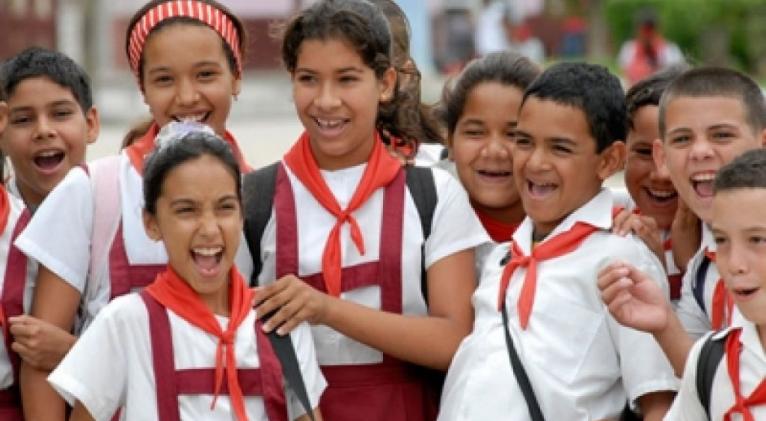Opening of a New Academic Year: A True Event
especiales

Raising the quality of education is an essential goal, for both general education as well as in the university. Several material and financial resources are devoted to achieve this goal.
New opportunities and dreams start up today in all domestic classrooms with the opening of a new academic year (2017-2018), which not only involves children, youths, and adolescents, but also parents, teachers, and professors.
In Cuba the beginning of every academic year is a true popular event. In the days prior the family takes care of preparing uniforms and other school materials, and at schools workers – both those who teach as well as support personnel - prepare the conditions so that institutions are clean and welcoming.
Raising the quality of education is still an essential purpose in both the general as the university teaching, several material and financial resources are devoted to achieve this goal. Just to mention an example, the Ministry of Education (MINED) it has prepared for this year a budget of 14 million CUC (Cuban convertible) for the acquisition of material resources.
Pass beyond difficulties - worsened by the blockade imposed for more than half a century by the United States - the Cuban State guarantees the basic materials to successfully complete the teaching-learning process.
In MINED, New Things Appear
Although the classes always begin in September, MINED long before begins to organize the coming academic year. Therefore, since the months of April and May it carries out a national training seminar that later is reproduced in the provinces and municipalities.
Now, the newest thing would be the introduction of 152 domestic schools (at different levels) the first results of the third process of improvement, a research the organization has been working on in the last years.
In this process are included the 1st, 2nd and 4th years of life of the First Childhood – earlier known as Preschool - and grades 1st, 4th, 7th and 10th, of Primary, Secondary and High school.
To cope with this experience, teachers and their bosses were trained, since new plans, programs, methodological orientations, textbooks and workbooks will be used.
In this regard, Irene Rivera Ferreiro, Vice-Minister working for the First Childhood branch, recently explained that there are steps in the improvement process associated to Educa a tu Hijo Program (Teach your Child)*, and to that end new materials have been elaborated aimed at facilitating the training of families.
She commented that in the Special Education particular emphasis is put on children with special educational needs associated to intellectual difficulties.
"So far we have spoken of mental retardation and today we are moving toward another term, less derogatory. Hence we consider it a disability that affects intellectual development. The largest registration is found in this type of teaching therefore there are many children inserted in the Primary Education, where it’s necessary the training of teachers to assist scholars with those characteristics", she emphasized.
In Secondary Education, said Margarita McPherson Sayú, there are several modifications. Although the subjects remain the same, the Natural Sciences is divided once more into Geography and Biology and they will be taught independently. She also indicated that Computer Sciences that was only taught in 7th grade now extends to 8th and 9th grades.
As regards pre-university, there would be a more direct look at Higher
Education, mainly from the organizational point of view.
According Mc Pherson, they are thinking to begin some activities,
especially in 11th grade, such as lectures, practical classes and
seminars.
For her part, the head of the sector Ena Elsa Velázquez Cobiella
highlighted that intensive works been carried out in all provinces and
territories as much in the repair and reconditioning of schools as in the
delivery of the basic school and life aids, and added that the school year
will begin in better conditions than in the previous stage.
Integration of all universities, an achievement
After several years assuming and applying an integration process, Higher
Education reaches this new academic year with that task concluded.
That has favored a more rational use of material resources and staffs. In
other words, pedagogical and sports universities have been affiliated to
the universities of the Ministry of Higher Education (MES) in each
province.
According to José Saborido Loidi, head of this institution, one of the
peculiarities of the school year that begins today is that a larger number
of careers join study plan E, which means changes in plans and programs,
and time reduction (four years) in certain specialties.
Now, the favorable results in the last entrance tests will allow that some
26000 students join the regular diurnal course; while 31000 others will
enroll encounter courses and 4000 the distance education modality.
Likewise general education, the university one –also despite shortages and
difficulties– has created all conditions to open its classrooms with the
support of an army of some 45000 teachers, who will have the high
responsibility to train their students academically and to foster
patriotic and citizen values in them.
Educational system in figures:
-Enrollment in general education: More than 1,750,000 students (the same
as in the previous academic year)
-Educational institutions: 10, 698,000
-Teaching coverage: It’s been guaranteed by 93 percent without the use of
alternatives (hired teachers, reinstated retirees, university students,
among others)
-Pedagogical schools (middle level): 26, including two newly inaugurated,
one in Havana and another in Guantanamo (Baracoa)
-Admission in pedagogical training with higher-middle level: It surpasses
9000 students, for a total number in the different study years of more
than 25000.
-Some 121,700, 000 9th grade graduates have been granted vacancies, which
represents 99,13 percent of the students who have decided to continue
their studies.
- Enrollment in Higher Education: 246,000 students and some 60,600,000 are
new.
*A non-institutional Cuban program that offers educational alternatives
for the children who do not have access to daycare centers, from before
their birth until their admission in 1st grade.
Cubasi Translation Staff













Add new comment